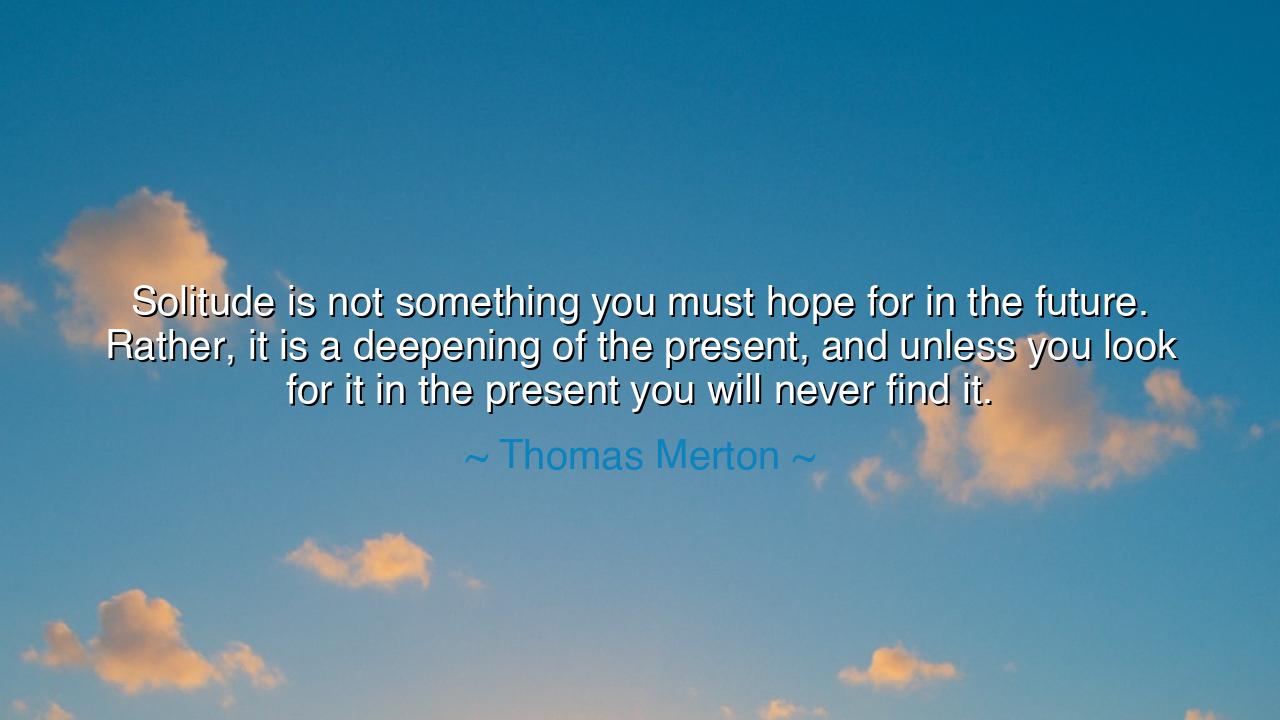
Solitude is not something you must hope for in the future.
Solitude is not something you must hope for in the future. Rather, it is a deepening of the present, and unless you look for it in the present you will never find it.






“Solitude is not something you must hope for in the future. Rather, it is a deepening of the present, and unless you look for it in the present you will never find it.” Thus spoke Thomas Merton, the monk, mystic, and writer who walked between two worlds—the world of the spirit and the noise of modern life. In these words lies a truth as ancient as the mountains and as immediate as the breath we take: that solitude is not a place, nor a time yet to come, but a way of being. It is the art of turning inward, of entering the quiet temple of one’s own soul. And this temple cannot be built in some distant tomorrow; it must be entered now, within the stillness of the moment that already is.
Merton’s origin as a spiritual thinker was shaped by paradox. He lived within the cloistered silence of a Trappist monastery in Kentucky, yet his writings reached millions around the world. He understood both the yearning for solitude and the fear of it, for in solitude we meet not only peace, but ourselves. When he wrote these words, he was not calling humanity to isolation, but to presence—to the realization that stillness is not found by escaping life, but by awakening within it. To wait for solitude in the future, he said, is to chase a mirage, for the future is but a dream. Only the present holds the doorway to the sacred.
To deepen the present—this is the heart of his message. Many seek peace as though it were a reward waiting beyond toil, a gift granted only after the storms of life have passed. But the wise know that peace is not the absence of chaos; it is the stillness beneath it. The one who seeks solitude by fleeing the world will never find it, for the same restless heart that runs from noise will carry its clamor into the wilderness. True solitude begins when the mind no longer reaches outward, but inward—when one sits quietly and listens, not to the world’s demands, but to the whisper of the eternal that speaks within.
History offers us the story of Marcus Aurelius, the Roman emperor and philosopher, who ruled over vast lands and endless turmoil. Surrounded by war and duty, he could have longed for retreat, for some distant peace beyond the battlefield. Yet he wrote, “Nowhere can man find a quieter or more untroubled retreat than in his own soul.” Like Merton, Aurelius understood that solitude is not a matter of geography, but of awareness. Even amidst the roar of the world, he found stillness by withdrawing into the sanctuary of his own mind. The man who learns this art becomes unshaken, for he carries within him a refuge that cannot be taken away.
Merton’s words also speak against the illusion of waiting—the idea that peace will come when life finally slows, when the burdens are lifted, when time allows. Yet time never allows; it only passes. The one who postpones stillness for the future will find only exhaustion. To live, truly live, is to stop seeking elsewhere what already lives within. Solitude is the flame at the heart of existence—it burns quietly in every moment, waiting for us to notice. To look for it in the present is to awaken to the miracle of being.
And what does it mean to live in such solitude? It is not withdrawal from others, but the cultivation of clarity and depth. The one who learns to be alone learns also to love more purely, to listen more deeply, to act without the desperate need for validation. Solitude sharpens perception and cleanses the heart. It is the wellspring of creativity, wisdom, and compassion. From it flows the strength to meet the world not as a servant of chaos, but as a bearer of peace.
Thus, my listener, take this as your lesson: do not wait for stillness to arrive as a gift from time. Seek it now, in the breath between thoughts, in the pause between tasks. When you walk, walk as though the earth itself were speaking to you. When you sit, let silence be your companion. Do not flee the noise of life; instead, become the calm at its center. For the one who learns to dwell fully in the present discovers that solitude is not emptiness, but fullness—a well of infinite depth from which the soul may drink forever.
And when you find that stillness—when you touch the heart of solitude—you will see, as Thomas Merton did, that it is not the absence of the world, but the presence of eternity. It is the meeting point between your small self and the vastness of the divine. It is here, and always here, in the luminous moment that never leaves: the now.






AAdministratorAdministrator
Welcome, honored guests. Please leave a comment, we will respond soon